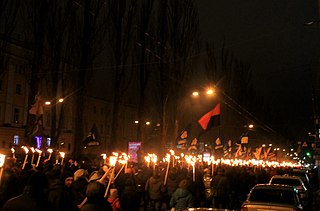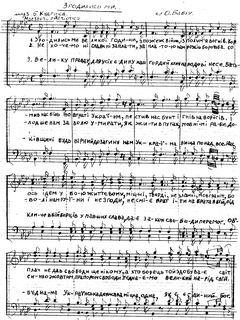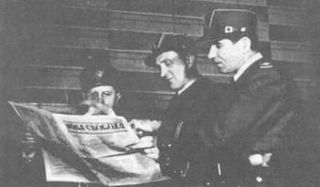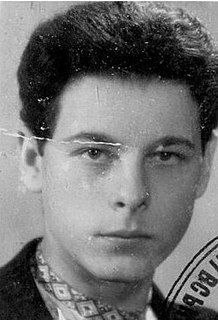 W
WThe assassination of Bronisław Pieracki, referred to as the Warsaw process in the Ukrainian historiography, was a well-orchestrated target killing of Poland's top politician of the interwar period, Minister of Interior Bronisław Pieracki (1895-1934) by the Organization of Ukrainian Nationalists (OUN) as a retaliation for the government policy of Pacification which was carried out by the police.
 W
WThe Banderivtsi are members of an assortment of right-wing organizations in Ukraine.
 W
WBereza Kartuska Prison was operated by Poland's Sanation government from 1934 to 1939 in Bereza Kartuska, Polesie Voivodeship. Because the inmates were detained without trial or conviction, it is considered an internment camp or concentration camp.
 W
WTaras Dmytrovych Borovets was a Ukrainian resistance leader during World War II. He is better known as Taras Bulba-Borovets after his nom de guerre Taras Bulba. His pseudonym is taken from the eponymous novel by the Ukrainian writer Nikolai Gogol.
 W
WThe act of restoration of the Ukrainian state or proclamation of the Ukrainian state of June 30, 1941 was announced by the Organization of Ukrainian Nationalists (OUN) under the leadership of Stepan Bandera, who declared an independent Ukrainian State in Lviv. The prime-minister was Yaroslav Stetsko, and the head of Council of Seniors was Kost Levitsky.
 W
WDmytro Ivanovych Dontsov was a Ukrainian nationalist writer, publisher, journalist and political thinker whose radical ideas were a major influence on the Organization of Ukrainian Nationalists.
 W
WOlha Yuriivna Hasyn – undercover agent of Organization of Ukrainian Nationalists, assistant and liaison officer of Roman Shukhevych, the leader of the Ukrainian Insurgent Army, and of Oleksa Hasyn, her husband and an important figure in UIA. In her native village there is a museum dedicated to her. Also, a street in Brovary is named after her.
 W
WDmytro Hrytsai was a leader in the Organization of Ukrainian Nationalists and a general in the Ukrainian Insurgent Army.
 W
WDmytro Klyachkivsky, also known by his pseudonyms Klym Savur, Okhrim, and Bilash, was a commander of the Ukrainian Insurgent Army (UPA), first head-commander of the UPA-North. He was responsible for the ethnic cleansing of Poles from Volhynia.
 W
WMykola Lemyk was a Ukrainian political activist and leader of the Organization of Ukrainian Nationalists (OUN).
 W
WThe March of Ukrainian Nationalists is a Ukrainian patriotic song that was originally the official anthem of the Organization of Ukrainian Nationalists and the Ukrainian Insurgent Army. The song is also known by its first line "We were born in a great hour". The song, written by Oles Babiy to music by Omelian Nyzhankivskyi in 1929, was officially adopted by the leadership of the Organization of Ukrainian Nationalists in 1932. The song is often referred to as a patriotic song from the times of the uprising, and a Ukrainian folk song. It is still commonly performed today, especially at events honoring the Ukrainian Insurgent Army and by nationalist organizations and party meetings, such as those of VO Svoboda.
 W
WThe massacres of Poles in Volhynia and Eastern Galicia, were carried out in German-occupied Poland by the Ukrainian Insurgent Army, or the UPA, with the support of parts of the local Ukrainian population against the Polish minority in Volhynia, Eastern Galicia, parts of Polesia and Lublin region from 1943 to 1945. The peak of the massacres took place in July and August 1943. Most of the victims were women and children. Many of the Polish victims regardless of age or gender were tortured before being killed; some of the methods included rape, dismemberment or immolation, among others. The UPA's actions resulted in between 50,000 and 100,000 deaths.
 W
WThe Nachtigall Battalion, also known as the Ukrainian Nightingale Battalion Group, or officially as Special Group Nachtigall, was the subunit under command of the German Abwehr special operations unit Lehrregiment "Brandenburg" z.b.V. 800. Along with the Roland Battalion it was one of two military units formed February 25, 1941 by head of the Abwehr Wilhelm Franz Canaris, which sanctioned the creation of the "Ukrainian Legion" under German command. It was composed of volunteer Ukrainians operating under Stephan Bandera's Organization of Ukrainian Nationalists (OUN) orders.
 W
WLev Rebet was a Ukrainian political writer and anti-communist during World War II. He was a key cabinet member in the Ukrainian government which proclaimed independence on June 30, 1941. For a time, Rebet was the leader of the Ukrainian government.
 W
WIvan Rohach was a Ukrainian journalist, poet, writer, and political activist born in Velykyi Bereznyi, Ung county, Austria-Hungary.
 W
WRoman-Taras Yosypovych Shukhevych, also known by his pseudonym Taras Chuprynka, was a Ukrainian nationalist, one of the commanders of Nachtigall Battalion, a hauptmann of the German Schutzmannschaft 201 auxiliary police battalion, a military leader of the Ukrainian Insurgent Army (UPA), and one of the organizers of the Galicia-Volhynia Massacres of approximately 100,000 Poles.
 W
WStepan Shukhevych was a Ukrainian lawyer and military figure.
 W
WBohdan Mykolayovych Stashynsky is a former KGB officer and spy who assassinated the Ukrainian nationalist leaders Lev Rebet and Stepan Bandera in the late 1950s. He defected in West Berlin in 1961.
 W
WMykola Stsiborskyi, also may be spelled Stsiborsky, Stsyborsky, Ściborski, or Sciborski was a Ukrainian nationalist politician who served on the Provid, or central leadership council of the Organization of Ukrainian Nationalists (OUN), and who was its chief theorist. He sided with Andriy Melnyk when the OUN split into two hostile factions, and was likely murdered by followers of Melnyk's rival Stepan Bandera.
 W
WMykhailo Pavlovych Teliha was an active Ukrainian community leader and distinguished musician. He was born in the Akhtyrka Stanitsa in the Kuban. It is here that he first became interested in playing the bandura in 1913. He trained initially as a forester and engineer and later he completed medical studies to become a doctor.
 W
WOlena Ivanivna Teliha was a Ukrainian poet and Ukrainian activist of Ukrainian and Belarusian ethnicity.
 W
WThe Ukrainian national government of 1941 was a self-proclaimed Ukrainian government established on the Ukrainian territories occupied by Nazi Germany. The government was established by the 30 June 1941 Act of restoration of the Ukrainian state. It was led by the Stepan Bandera's faction of OUN.
 W
WThe Ukrainian Insurgent Army was a Ukrainian nationalist paramilitary and later partisan formation. During World War II, it was engaged in guerrilla warfare against the Soviet Union, the Polish Underground State, Communist Poland, and Nazi Germany. It was established by the Organization of Ukrainian Nationalists. The insurgent army arose out of separate militant formations of the Organization of Ukrainian Nationalists—Bandera faction, other militant national-patriotic formations, some former defectors of the Ukrainian Auxiliary Police, mobilization of local populations and others. The political leadership of the army belonged to the Organization of Ukrainian Nationalists—Bandera. It was the primary perpetrator of the ethnic cleansing of Poles in Volhynia and Eastern Galicia. Its official date of creation is 14 October 1942, day of the Intercession of the Theotokos feast. The Ukrainian People's Revolutionary Army at the period from December 1941 untl July 1943 has the same name.
 W
WUkrainian National Army (UNA) was a World War II Ukrainian military group, created on March 17, 1945 in Weimar, Germany, and subordinate to Ukrainian National Committee.
 W
WPatriarch Dymytriy (Yarema) was the second patriarch of Kyiv and all Ukraine, and of the Ukrainian Autocephalous Orthodox Church (UAOC). Patriarch Dymytriy (Yarema) was successor to Patriarch Mstyslav (Skrypnyk) from 1993 to 2000 and was succeeded by Metropolitan Mefodiy (Kudryakov).